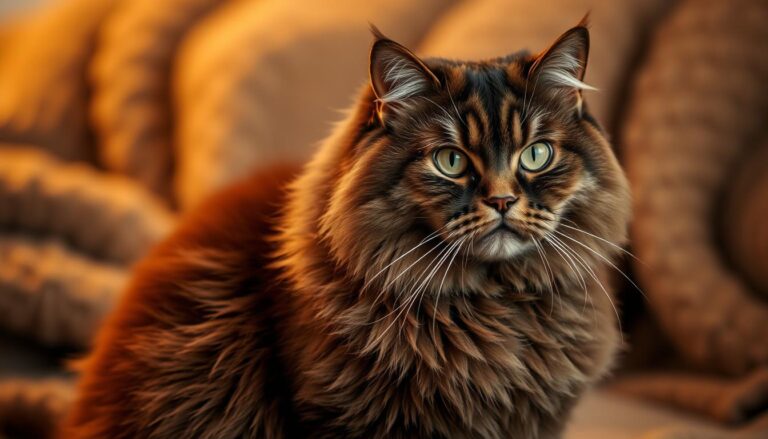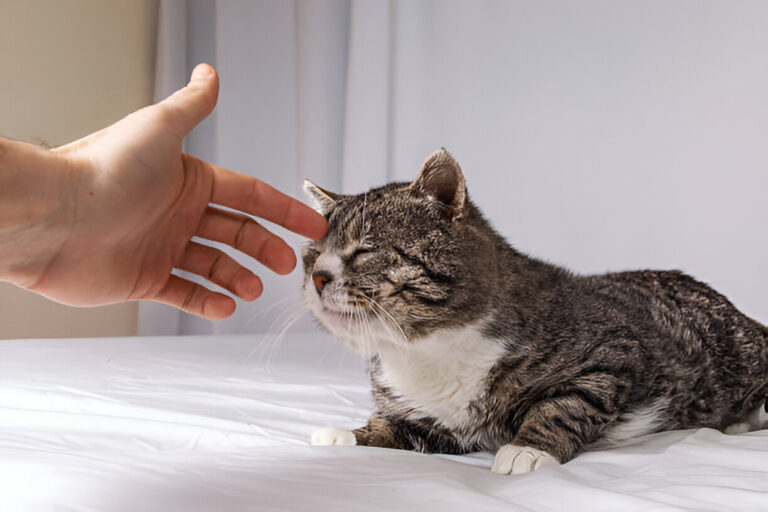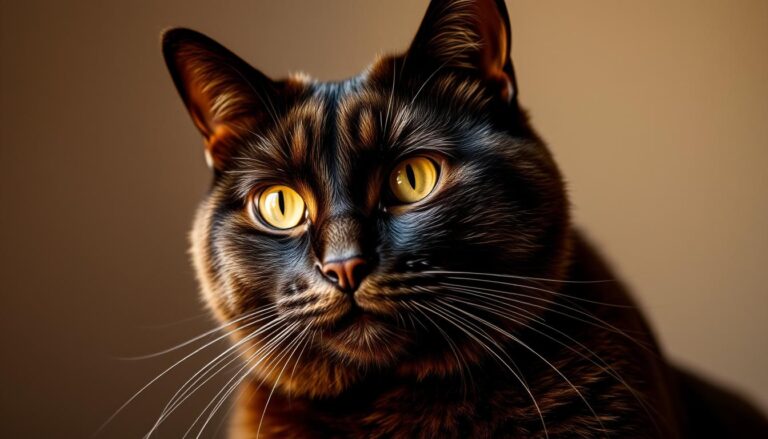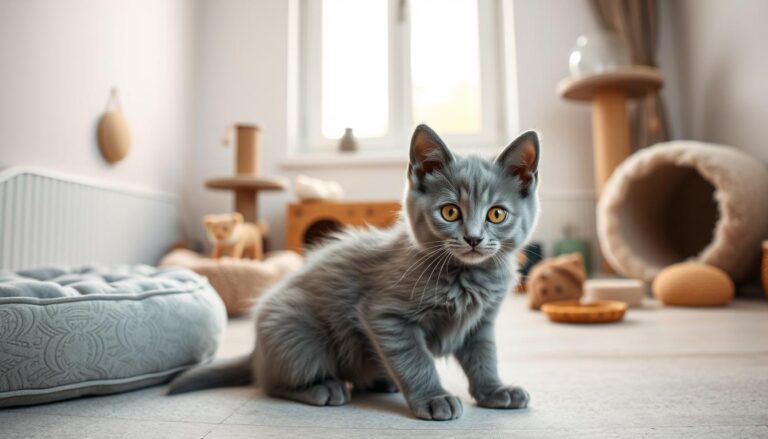How to Choose a Reputable British Shorthair Breeder
Table of Contents
Getting a British Shorthair is more than getting a pet. It’s welcoming a new family member with a rich history and unique personality. I learned that not all breeders are the same. The right choice can make a big difference in your pet’s health and happiness.
Finding a good British Shorthair breeder takes time and effort. Your new pet deserves a great start in life. This means they should be healthy, well-socialized, and have good genetics. A good breeder cares about the breed’s standards and supports you for life.
Finding the right British Shorthair breeder can seem hard. But with the right information, you can make a smart choice. This choice protects your investment and your pet’s health.
Key Takeaways
- Research is crucial when selecting a British Shorthair breeder
- Look for breeders committed to breed standards and health
- Reputable breeders offer comprehensive support and transparency
- Genetic health testing is a critical factor in breeder selection
- Personal interaction with the breeder reveals their dedication
Understanding British Shorthair Breed Standards
Exploring the world of British Shorthair cats is exciting. Knowing their breed standards is key for owners. These cats are known for their looks and calm nature, making them a favorite among cat lovers.
The British Shorthair has a unique history. They come from the United Kingdom. Their special traits make them stand out.
Physical Characteristics That Define the Breed
A purebred British Shorthair has distinct physical traits:
- Round, robust body with substantial muscle mass
- Broad, chunky face with distinctive chubby cheeks
- Medium-sized ears with rounded tips
- Large, expressive copper or gold-colored eyes
- Thick, plush coat with a dense, crisp texture
Temperament and Personality Traits
British Shorthair cats are calm and easygoing. They are known for:
- Gentle and relaxed disposition
- Moderate level of playfulness
- Independent yet affectionate personality
- Excellent companionship for families and individuals
Breed-Specific Health Considerations
British Shorthair cats are generally healthy. But, they might have some genetic issues. Responsible breeders check for health problems to reduce risks.
“A well-bred British Shorthair is a treasure of feline genetics and companionship.” – Feline Breeding Association
Show Quality vs. Pet Quality
Not all British Shorthair cats are show-ready. Pet quality cats are just as loving, with some differences. The most important thing is finding a healthy, friendly cat that suits your life.
What Makes a British Shorthair Breeder Reputable
Choosing a reputable breeder is key when you want a British Shorthair. A great breeder does more than just sell cute kittens. They focus on health, genetics, and responsible breeding.
Here are some important traits of a reputable breeder:
- Transparent genetic health testing for breeding cats
- Comprehensive veterinary documentation
- Limited breeding cycles to protect maternal health
- Clean, enriching living environments for cats
- Dedicated socialization programs for kittens
A good breeder values quality over quantity. They spend a lot of time and effort on genetics and health. They also limit litters to give each kitten the best care.
“A true reputable breeder sees their cats as family, not inventory.” – Professional Cat Breeder Association
When looking for a breeder, find someone who knows a lot about British Shorthairs. They should be happy to talk about their breeding and answer your questions.
Your perfect breeder will love the British Shorthair breed. They aim to raise healthy, friendly kittens that show the best of their lineage.
Essential Credentials and Certifications to Look For
When looking for a good British Shorthair breeder, knowing what to look for is key. These certifications show a cattery’s dedication to raising healthy, top-quality cats.
Finding a British Shorthair breeder needs careful checking of their credentials. The right certifications help spot a trustworthy and ethical cattery.
TICA and CFA Registration
Professional registrations are vital for a trustworthy British Shorthair breeder. Two main groups verify breeder skills:
- The International Cat Association (TICA)
- Cat Fanciers’ Association (CFA)
These groups have strict rules for cat breeding. They ensure the cats’ genetic health and well-being.
Health Testing Certifications
Good breeders do thorough health checks on their cats. Important health certifications include:
- Genetic disorder screenings
- Heart health evaluations
- Hypertrophic cardiomyopathy (HCM) testing
| Certification Type | Purpose | Importance |
|---|---|---|
| Genetic Screening | Detect inherited conditions | High |
| HCM Testing | Screen for heart diseases | Critical |
| Blood Work | Overall health assessment | Essential |
Professional Organization Memberships
More memberships can also prove a breeder’s worth. Look for ties with:
- National breed-specific associations
- Local veterinary networks
- Feline health research groups
These memberships show a breeder’s commitment to learning and improving the breed.
Red Flags When Selecting a Cattery
Choosing the right cattery for British Shorthair kittens is crucial. Not all breeding facilities are the same. Knowing the warning signs helps avoid unethical breeders.
When looking at a cattery, watch for these red flags:
- Unsanitary or overcrowded living conditions for British Shorthair kittens
- Breeder’s reluctance to show entire breeding facility
- Absence of clear health guarantees
- Pressure to purchase without proper screening
- Unrealistically low pricing for purebred kittens
Communication quality is key in a reputable cattery. Ethical breeders answer your questions and share details about their breeding program. Be wary of breeders who:
- Dodge specific questions about kitten lineage
- Refuse to provide veterinary references
- Cannot or will not share health testing documentation
- Seem evasive about their breeding practices
“A responsible cattery is an open book. If something feels hidden, trust your instincts.”
Your careful research protects you and the kittens. It ensures you find a trustworthy breeder who cares for the kittens’ well-being.
Questions to Ask Your British Shorthair Breeder
Finding the right British Shorthair breeder needs careful research and asking the right questions. Talking to a breeder can give you important info about the cat’s health, upbringing, and quality.
Having a list of questions ready will help you choose the best British Shorthair for you.
Health Guarantee Inquiries
Ask about the breeder’s health screening practices:
- What genetic tests do you perform on breeding cats?
- Can you provide documentation of health clearances?
- What specific health guarantees do you offer?
- How long does your health warranty cover potential genetic issues?
Breeding Program Details
Knowing how the breeder breeds is important for supporting responsible cat breeding:
- How frequently do you breed your British Shorthair cats?
- What criteria do you use for selecting breeding pairs?
- Do you specialize in specific coat colors or patterns?
- Are your breeding cats registered with TICA or CFA?
Kitten Socialization Practices
Early socialization is key for well-adjusted kittens. Ask about their kitten-raising methods:
- How do you expose kittens to different household sounds?
- What interaction do kittens have with humans and other animals?
- Do you implement any specific early socialization techniques?
- At what age do kittens typically become ready for their new homes?
A good British Shorthair breeder will be open to your questions and give clear answers about their breeding and kitten care.
Visiting the Breeding Facility: What to Observe
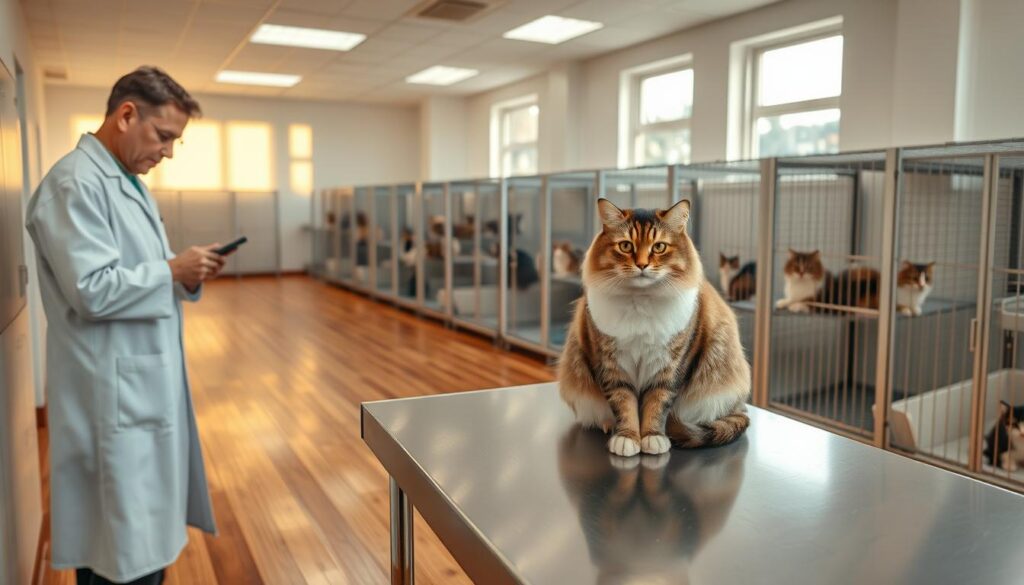
Looking for a British Shorthair cat? Visiting the cattery in person is key. You’ll get to see firsthand how the kittens are raised and the health of the cats.
When you visit, look closely at a few important things. They show if the breeding facility is top-notch:
- How clean and well-kept the living areas are
- The health and looks of the adult cats and kittens
- If the cats get to socialize with others
- How the breeders interact with the cats
Good British Shorthair catteries will let you inspect and be open. Look for these signs of a great breeding place:
| Positive Signs | Warning Signals |
|---|---|
| Clean, spacious living areas | Cramped or dirty spaces |
| Cats appear healthy and well-groomed | Cats showing signs of illness |
| Calm, social cat behavior | Aggressive or fearful cats |
Pro tip: A responsible British Shorthair cattery will encourage you to meet the parent cats and observe the kittens’ living conditions.
“The environment speaks volumes about a breeder’s commitment to their cats’ well-being.” – Feline Breeding Experts
Trust your gut during the visit. A professional cattery will be open, proud of their practices, and ready to answer your questions about their British Shorthair cats.
Understanding Breeding Contracts and Documentation
Getting into the world of british shorthair kittens means you need to know about legal papers. A detailed breeding contract is key when you’re ready to adopt a kitten. It’s like a guide for your kitten’s future.
A good breeding contract has important parts. It protects your money and makes sure your kitten is healthy.
Purchase Agreement Terms
Your contract should have clear details about the kittens you’re buying. Important parts include:
- Exact purchase price
- Deposit requirements
- Payment schedule
- Transfer of ownership details
Health Warranty Details
Good breeders offer health guarantees. Look for contracts that include:
- Genetic health screening results
- Initial veterinary examination documentation
- Specific timeframe for health guarantees
- Conditions for potential replacement or refund
Spay/Neuter Requirements
Most contracts say you must spay or neuter non-show kittens. This helps control breeding and supports responsible pet ownership. Breeders usually have specific rules about:
- Required age for spay/neuter procedure
- Proof of surgical completion
- Potential contract penalties for non-compliance
Knowing these contract parts makes adopting a kitten easier. It also starts a happy, healthy life with your new kitten.
Proper Pricing and Payment Practices

Getting a purebred British Shorthair comes with a cost. Prices can change based on several factors. A good breeder might ask for $1,500 to $3,000 for a top-notch kitten.
The price of a British Shorthair depends on a few things:
- Pedigree quality and bloodline
- Unique coat colors and patterns
- Potential for show competitions
- Genetic health certifications
- Breeder’s reputation and breeding standards
Dealing with a reputable breeder means clear prices. They usually ask for:
- An initial non-refundable deposit (usually $500-$750)
- Multiple payment options including credit card, bank transfer, or cash
- Detailed documentation of the kitten’s health history
- Clear contract outlining purchase terms
Watch out for low prices or odd payment methods like wire transfers or cryptocurrency. They might be scams. Always talk openly with your breeder and check their credentials before paying.
Buying from a responsible breeder means you get a healthy, friendly cat. You’ll also get all the health info you need.
Timeline for British Shorthair Kitten Adoption
Adopting British Shorthair kittens needs careful planning. Start by finding reputable breeders who specialize in these cats. You’ll need to get on a waiting list, which can take months.
The adoption timeline is usually 12-16 weeks. This allows enough time for socialization and health checks. Breeders make sure kittens get vaccinations and health screenings before they go home. This is key for their health and happiness.
Waiting List Insights
When you want to adopt a British Shorthair kitten, you’ll need to pay a deposit and fill out an application. Breeders check if you’re a good match for their kittens. They want to make sure you know how to care for them and will give them a loving home.
Preparation Milestones
Getting ready for your new kitten involves a few important steps. Set up a safe, cozy space with things like a litter box, scratching post, and good food. Also, make sure you have comfy bedding.
Take your kitten to the vet within a week of bringing them home. This helps set up a health plan and discuss ongoing care.
FAQ
What should I look for in a reputable British Shorthair breeder?
How much does a British Shorthair kitten typically cost?
What should I look for in a reputable British Shorthair breeder?
How much does a British Shorthair kitten typically cost?
FAQ
What should I look for in a reputable British Shorthair breeder?
A reputable British Shorthair breeder should have clear breeding practices. They should also do genetic health tests and socialize kittens well. Look for membership in groups like TICA or CFA.
A good breeder will share health records and let you visit. They should care more about the cat’s health than making money.
How much does a British Shorthair kitten typically cost?
A British Shorthair kitten can cost between
FAQ
What should I look for in a reputable British Shorthair breeder?
A reputable British Shorthair breeder should have clear breeding practices. They should also do genetic health tests and socialize kittens well. Look for membership in groups like TICA or CFA.
A good breeder will share health records and let you visit. They should care more about the cat’s health than making money.
How much does a British Shorthair kitten typically cost?
A British Shorthair kitten can cost between $1,500 and $3,500. The price depends on the kitten’s pedigree, coat color, and show potential. Show-quality kittens cost more.
Be careful of very low prices. They might mean the breeder is not reputable.
What health tests should a responsible British Shorthair breeder perform?
A responsible breeder should test for Hypertrophic Cardiomyopathy (HCM), Progressive Retinal Atrophy (PRA), and blood type. They should also test for common feline diseases.
Make sure the breeding cats are healthy. This prevents passing on genetic issues to kittens.
At what age can I bring home a British Shorthair kitten?
You can get a British Shorthair kitten between 12 to 16 weeks old. This age is best for socialization and vaccinations. Kittens learn important skills from their mother and littermates.
What red flags should I watch for when selecting a British Shorthair breeder?
Watch out for breeders who are secretive or pushy. They might not want to show their facilities or provide health records. Be cautious of low prices and unsanitary conditions.
A good breeder is open and professional. They prioritize their cats’ health.
How do I know if a British Shorthair is show quality or pet quality?
Show-quality British Shorthairs meet strict standards. They have the right coat color, body, and face. Pet-quality cats might not meet these standards but are still healthy and friendly.
A reputable breeder can explain the differences. They can help you choose the right kitten for you.
What documentation should I receive when purchasing a British Shorthair kitten?
You should get a detailed purchase contract. It should include health guarantees, pedigree, and vaccination records. It should also cover spay/neuter requirements.
Look for genetic health testing results, microchip info, and care instructions. This ensures your kitten is well taken care of.
,500 and ,500. The price depends on the kitten’s pedigree, coat color, and show potential. Show-quality kittens cost more.
Be careful of very low prices. They might mean the breeder is not reputable.
What health tests should a responsible British Shorthair breeder perform?
A responsible breeder should test for Hypertrophic Cardiomyopathy (HCM), Progressive Retinal Atrophy (PRA), and blood type. They should also test for common feline diseases.
Make sure the breeding cats are healthy. This prevents passing on genetic issues to kittens.
At what age can I bring home a British Shorthair kitten?
You can get a British Shorthair kitten between 12 to 16 weeks old. This age is best for socialization and vaccinations. Kittens learn important skills from their mother and littermates.
What red flags should I watch for when selecting a British Shorthair breeder?
Watch out for breeders who are secretive or pushy. They might not want to show their facilities or provide health records. Be cautious of low prices and unsanitary conditions.
A good breeder is open and professional. They prioritize their cats’ health.
How do I know if a British Shorthair is show quality or pet quality?
Show-quality British Shorthairs meet strict standards. They have the right coat color, body, and face. Pet-quality cats might not meet these standards but are still healthy and friendly.
A reputable breeder can explain the differences. They can help you choose the right kitten for you.
What documentation should I receive when purchasing a British Shorthair kitten?
You should get a detailed purchase contract. It should include health guarantees, pedigree, and vaccination records. It should also cover spay/neuter requirements.
Look for genetic health testing results, microchip info, and care instructions. This ensures your kitten is well taken care of.


